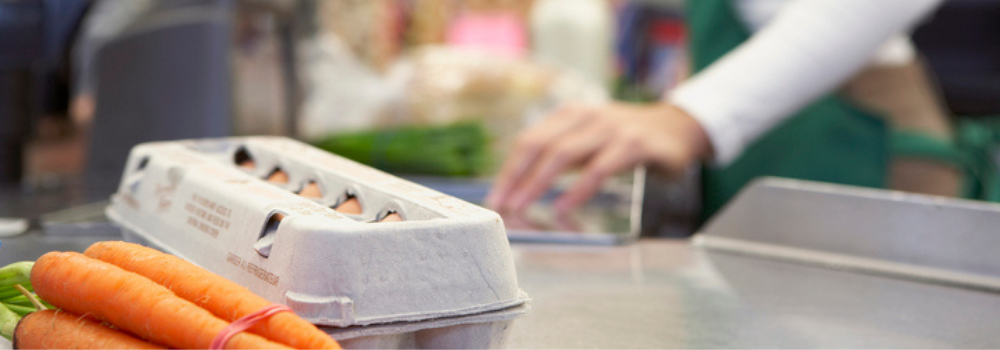
Eggs are a daily staple in many homes across Canada and even the world! They’re so common that we don’t always stop to think about how fascinating they really are. We’ve gathered some of our favourite facts together to answer questions that you might have about eggs.
Facts About Eggs
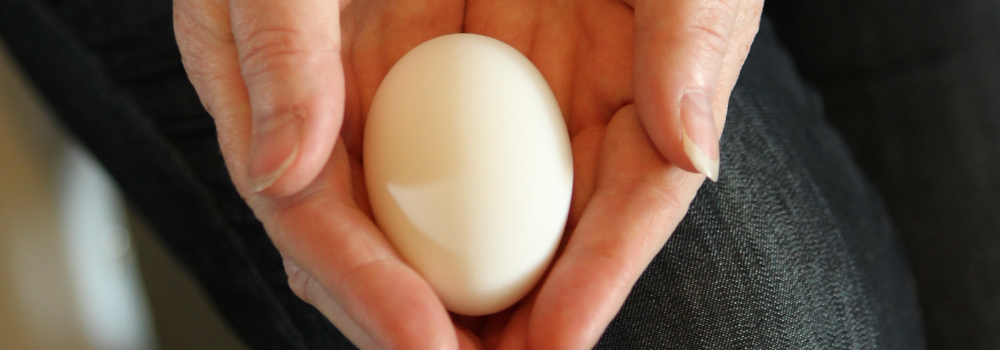
What are egg shells made of?
Egg shells are mostly composed of calcium carbonate plus some magnesium carbonate, calcium phosphate and other organic matter, including protein. Crushed egg shells can add valuable nutrients to soil. The calcium in the shells will help plants grow. Just be sure to crush the shells before you add them to your garden, otherwise they will break down very slowly.
How fresh are eggs at the grocery store?
Ontario eggs are delivered from the farm to your grocery store in about 4 to 7 days. This is how long the grading and delivery process takes, and can sometimes be even shorter! Make sure to check your egg carton for a best before date but typically it’ll be around 28 days after purchase.
What are Omega-3 eggs?
All eggs naturally contain some omega-3, but omega-3 enhanced eggs are laid by hens fed a diet that contains 10 to 20 percent flaxseed. Flaxseed contains omega-3 polyunsaturated fatty acids that are known to reduce the risk of heart disease and cancer.
Omega-3 eggs contain 0.4 g of omega-3 compared to 0.1 g omega-3 found in classic eggs. (Health Canada recommends we eat 1 to 1.5 g of omega-3 fat each day.)
WHAT ARE SOME NOT SO WELL KNOWN FACTS ABOUT EGGS?
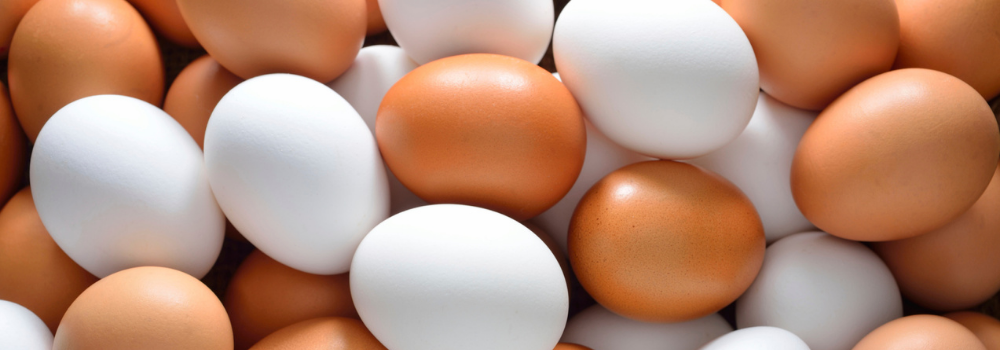
Double yolks - what are they?
A hen will sometimes lay an egg with two yolks when she is beginning to lay eggs (at about 17 or 18 weeks of age) or near the end of her reproductive life due to hormonal changes. When this happens, the shell forms around two yolks instead of one, creating a double-yolked egg. Double-yolked eggs are safe to eat and cook with. If you want to use them in a recipe (most recipes are written for large eggs), their additional volume may affect the outcome of the recipe.
Dark yolk are better, right?
Egg yolk colour can range from pale yellow to deep orange. It does not affect the flavour, nutrient value or quality of the egg. The colour of the yolk is actually entirely dependent on what a hen eats! A diet richer in corn-based meal will render a darker yolk, whereas wheat-based diets result in a paler yolk. Geography affects what types of grains are locally available to feed to the hens. Most importantly, all feed is carefully balanced to ensure the laying hens are getting the nutrients they require for good health.
Cholesterol – what’s the deal with it?
Scientific research now shows that dietary cholesterol (the cholesterol in food) has a minimal effect on the blood cholesterol level in our body. To control blood cholesterol, it is more important to cut back on saturated fats and trans fats. Eggs contain very little saturated fat and absolutely no trans fat! So the good news is eating eggs will not increase your risks for heart disease.
Eggs contain many important nutrients your body needs such as protein, B vitamins, zinc, iron, choline and lutein. If you were to leave eggs out of your diet because of concerns about dietary cholesterol, you would be missing out on these wonderful nutrients.
If you have elevated blood cholesterol, you can likely enjoy eggs more often than you think. Get personalized advice by talking it over with a registered dietitian or doctor.
FACTS ABOUT HENS
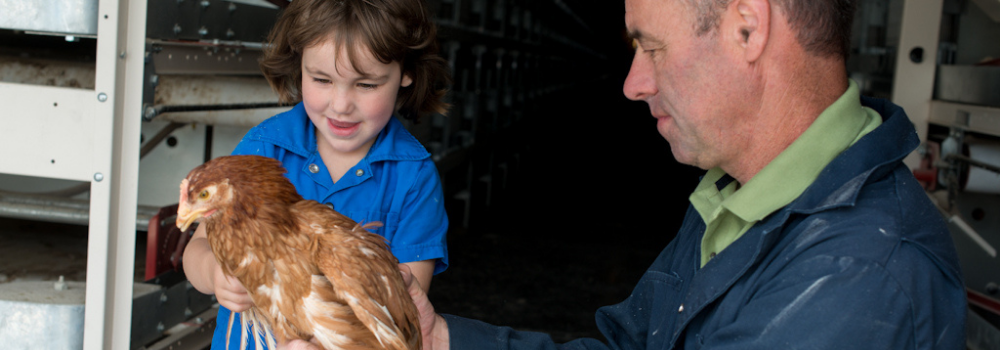
Where do hens live?
There are many ways that hens are housed. Many live inside barns across Ontario. This helps to protect the birds from disease and predators, as well as the variable weather of Canada. The type of barn a farmer has depends on many factors including bird health and well-being, farm employee work environments, economics and market demand.
Are hens given hormones or antibiotics?
It is illegal to give hormones to hens in Canada. Hens don’t need hormones! They will lay eggs without additional prompting or assistance. The only way a hen will receive antibiotics is if she is unwell (prescribed by a vet, just like a doctor would for a human). If a hen is sick, she likely won’t be laying eggs but if she does lay eggs while being treated with antibiotics, the eggs are not sold for human consumption. Antibiotics are never used on the eggs themselves either!
Are hens in Canada treated well?
In Canada, we have a Code of Practice when it comes to the treatment of hens. It was developed with experts from organizations including the Canadian Veterinarian Medical Association, the Canadian Federation of Humane Societies, the Canadian Food Inspection Agency, poultry scientists and egg farmers. All egg farms in Canada must adhere to it! It ensures that hens have enough space, water, feed, lighting, and air circulation. It also ensures that they are handled ethically and that the farm has appropriate conditions. We are so proud to be world leaders in our high standards! Our Code of Practice in combination with the passion and dedication of our farmers allows for hens in Canada to be treated ethically and humanely.
FACTS ABOUT CHICKEN LAYING EGGS
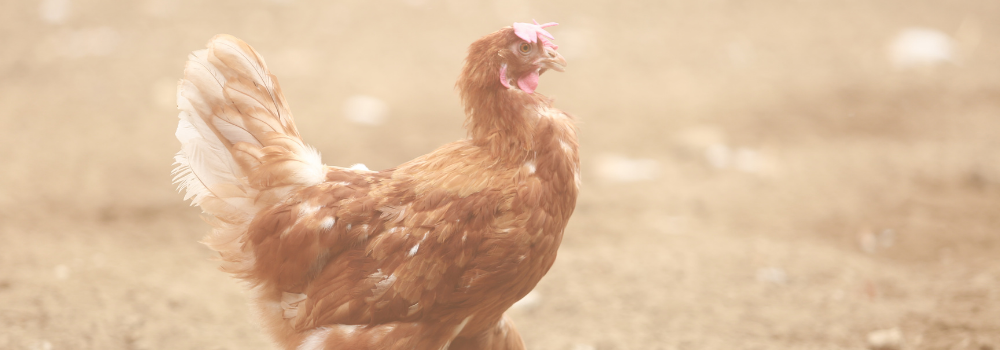
How old are hens when they start laying eggs?
When born, a hen is called a "pullet". A hen reaches the age of maturity between 18 and 20 weeks and that's when she begins to regularly lay eggs.
What about egg shells?
The thickness of an egg shell is related to egg size, and egg size is related to the hen's age. As a hen ages, egg size increases. But the same amount of shell that covers a smaller egg must be stretched to cover a larger one. This means the shells of larger eggs are thinner than those of smaller eggs.
Are roosters needed to make eggs?
Not at all! Hens lay eggs whether a rooster is present or not. Farmers will bring a rooster around their hens when they would like the eggs to be fertilized. A fertilized egg can produce a chick! These are not the type of eggs sold in stores for consumers to eat.
EGG FACTS FOR KIDS
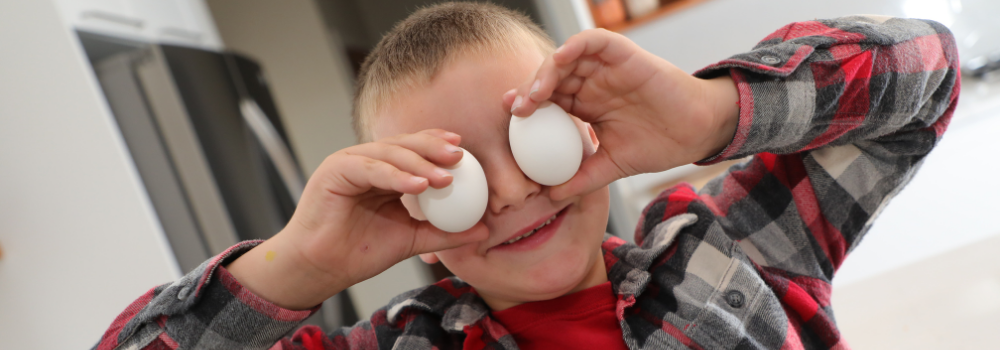
How many eggs does a hen lay?
A laying hen lays about 340 eggs each year! They sure keep our farmers busy year round.
What’s the difference between a brown and white egg?
There is no nutritional difference between brown and white eggs. The reason they are different in colour is due to the breed of the hen. (Typically, white hens lay white eggs and brown hens lay brown eggs).
What makes eggs different sizes?
As hens age, the size of their eggs increases too!
How is egg size calculated?
Egg “size” is determined by how much the egg weighs, not by its circumference. That’s why in an egg carton that you buy from the grocery store you might see eggs that look a little bit different in size. But if you were to weigh them individually, you’d find that they’re all within the range of 6 grams of one another.
How many eggs do Canadians eat per year?
The average Canadian eats about 242 eggs per year. Canadian egg farmers provide about 650 million dozens of eggs to our country each year! That’s 7.8 BILLION eggs! That could mean one egg per year for each person on the entire planet!
How long does it take for eggs to get from the farm to the store?
The process of washing the eggs (in a mild food-safe detergent and warm water), weighing them, grading them and transporting them takes about 4-7 days. It can even take as little as one day during peak seasons (like Christmas and Easter)!
Are eggs only used for cooking?
Although they are delicious and nutritious, eggs have been known to be helpful in other ways too. Did you know that eggs are part of some beauty routines? Because of the fats and proteins in egg yolks, they can be incredibly nourishing for the scalp and hair shaft! Whole eggs are used to add moisture to a natural face masks. Glowing complexion, here we come!
Out of glue? No time to run to the store? Try an egg white! Yolks work too, but whites will dry clear on your projects. Egg whites have been used as a natural adhesive for centuries. If you’ve got lightweight crafts you’d like to glue together, brush on some egg whites!
Another hidden talent that egg whites have is their ability to shine leather. Rub whites on your leather shoes. They’ll remove any dirt and leave your shoes with a sparkling shine. Remove any excess with a damp cloth.
EGG JOKES
Q: What kind of egg lives by the sea?
A: An egg shell
Q: Why did the chicken join the rock band?
A: Because she had drumsticks
Q: Why can’t you tease egg whites?
A: Because they can’t take a yolk
Q: What do you call an egg that goes on a safari?
A: An egg-sporer